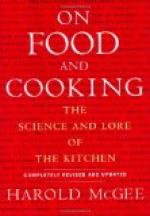Steaming, as its name implies, is the cooking of food by the use of steam. There are several ways of steaming, the most common of which is by placing the food in a perforated dish over a vessel of boiling water. For foods not needing the solvent powers of water, or which already contain a large amount of moisture, this method is preferable to boiling. Another form of cooking, which is usually termed steaming, is that of placing the food, with or without water, as needed, in a closed vessel which is placed inside another vessel containing boiling water. Such an apparatus is termed a double boiler. Food cooked in its own juices in a covered dish in a hot oven, is sometimes spoken of as being steamed or smothered.
Stewing is the prolonged cooking of food in a small quantity of liquid, the temperature of which is just below the boiling point. Stewing should not be confounded with simmering, which is slow, steady boiling. The proper temperature for stewing is most easily secured by the use of the double boiler. The water in the outer vessel boils, while that in the inner vessel does not, being kept a little below the temperature of the water from which its heat is obtained, by the constant evaporation at a temperature a little below the boiling point.
Frying, which is the cooking of food in hot fat, is a method not to be recommended—Unlike all the other food elements, fat is rendered less digestible by cooking. Doubtless it is for this reason that nature has provided those foods which require the most prolonged cooking to fit them for use with only a small proportion of fat, and it would seem to indicate that any food to be subjected to a high degree of heat should not be mixed and compounded largely of fats. The ordinary way of frying, which the French call sauteing, is by the use of only a little fat in a shallow pan, into which the food is put and cooked first on one side and then the other. Scarcely anything could be more unwholesome than food prepared in this manner. A morsel of food encrusted with fat remains undigested in the stomach because fat is not acted upon by the gastric juice, and its combination with the other food elements of which the morsel is composed interferes with their digestion also. If such foods are habitually used, digestion soon becomes slow and the gastric juice so deficient in quantity that fermentation and putrefactive changes are occasioned, resulting in serious disturbance of health. In the process of frying, the action of the heat partially decomposes the fat; in consequence, various poisonous substances are formed, highly detrimental to the digestion of the partaker of the food.
ADDING FOODS TO BOILING LIQUIDS.—Much of the soddenness of improperly cooked foods might be avoided, if the following facts were kept in mind:—




